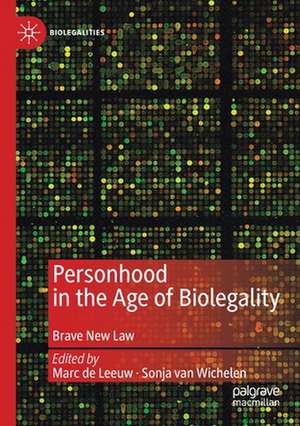Personhood in the Age of Biolegality: Brave New Law: Biolegalities
Editat de Marc de Leeuw, Sonja van Wichelenen Limba Engleză Paperback – 27 noi 2020
| Toate formatele și edițiile | Preț | Express |
|---|---|---|
| Paperback (1) | 766.42 lei 6-8 săpt. | |
| Springer International Publishing – 27 noi 2020 | 766.42 lei 6-8 săpt. | |
| Hardback (1) | 770.46 lei 6-8 săpt. | |
| Springer International Publishing – 27 noi 2019 | 770.46 lei 6-8 săpt. |
Preț: 766.42 lei
Preț vechi: 934.66 lei
-18% Nou
Puncte Express: 1150
Preț estimativ în valută:
146.72€ • 150.89$ • 121.72£
146.72€ • 150.89$ • 121.72£
Carte tipărită la comandă
Livrare economică 19 februarie-05 martie
Preluare comenzi: 021 569.72.76
Specificații
ISBN-13: 9783030278502
ISBN-10: 3030278506
Pagini: 261
Ilustrații: XX, 261 p. 1 illus.
Dimensiuni: 148 x 210 mm
Greutate: 0.37 kg
Ediția:1st ed. 2020
Editura: Springer International Publishing
Colecția Palgrave Macmillan
Seria Biolegalities
Locul publicării:Cham, Switzerland
ISBN-10: 3030278506
Pagini: 261
Ilustrații: XX, 261 p. 1 illus.
Dimensiuni: 148 x 210 mm
Greutate: 0.37 kg
Ediția:1st ed. 2020
Editura: Springer International Publishing
Colecția Palgrave Macmillan
Seria Biolegalities
Locul publicării:Cham, Switzerland
Cuprins
Acknowledgements.-Chapter 1. Brave New Law: Personhood in the Age of Biolegality
PART I – TROUBLING PERSONS.- Chapter 2. Spectral Personas: Exploring the Constitution and Legal Standing of “Virtual Personhood”.- Chapter 3. The Political Economy of Neurolaw: Can Neurolaw Destabilize the Neoliberal Discourse about Personal Responsibility?.- Chapter 4. Legal Personhood in Postgenomic Times: Plasticity, Rights, and Relationality.- PART II – EVIDENCING PERSONS.- Chapter 5. “The Proof is in my Chromosomes”: Translating Radiation Exposure into Legal Liability and State Culpability..- Chapter 6. Narrative Epistemology in Jurisprudence and Elective Affinities in Productions of Responsibility for Persons in Pain.- Chapter 7. Racial Futurity: Biolegality and the Question of Black Life .- PART III – GOVERNING PERSONS.- Chapter 8. Evident Genomes: Phenotypic Personhood and the Epigenetic Processing of Asylum.-Chapter 9. CRISPR Cowboys? Genetic Self-Experimentation and the Limits of the Person.-Chapter 10. In Genes We Trust: Genetic Privacy in the Age of Precision Medicine.-PART IV – THE FUTURE OF PERSONS.- Chapter 11.“The Obsolescence of Human Beings” and the Future of Law’s Natural Persons: Transformations of Legal Personhood Through the Lens of “Promethean Shame.- Chapter 12. Distributed Cognition, Distributed Persons, and the Foundations of Law.- Chapter 13. Legal Personality in Trusts and Corporations.-Chapter 14. Afterword: After the Great Undoing.
Notă biografică
Marc de Leeuw is Senior Lecturer at the Law School of the University of New South Wales, Australia, and convener of the UNSW Law Initiative for Biolegalities (IBL). His book Homo Capax. Paul Ricoeur’s Renewal of Philosophical Anthropology is forthcoming.
Sonja van Wichelen is Associate Professor of Sociology at the University of Sydney, Australia, and Director of the Biopolitics of Science Research Network. She is the author of Legitimating Life: Adoption in the Age of Globalization and Biotechnology (2018) and Religion, Gender and Politics in Indonesia: Disputing the Muslim Body (2010).
Sonja van Wichelen is Associate Professor of Sociology at the University of Sydney, Australia, and Director of the Biopolitics of Science Research Network. She is the author of Legitimating Life: Adoption in the Age of Globalization and Biotechnology (2018) and Religion, Gender and Politics in Indonesia: Disputing the Muslim Body (2010).
Textul de pe ultima copertă
This volume showcases emerging interdisciplinary scholarship that captures the complex ways in which biological knowledge is testing the nature and structure of legal personhood. Key questions include: What do the new biosciences do to our social, cultural, and legal conceptions of personhood? How does our legal apparatus incorporate new legitimations from the emerging biosciences into its knowledge system? And what kind of ethical, socio-political, and scientific consequences are attached to the establishment of such new legalities? The book examines these problems by looking at materialities, the posthuman, and the relational in the (un)making of legalities. Themes and topics include postgenomic research, gene editing, neuroscience, epigenetics, precision medicine, regenerative medicine, reproductive technologies, border technologies, and theoretical debates in legal theory on the relationship between persons, property, and rights.
Caracteristici
Seeks to understand the shifting meaning of personhood in light of recent biotechnological developments Outlines the stakes involved in our development and understanding of modern personhood Attempts to theorize alternative understandings of personhood from a legal perspective


